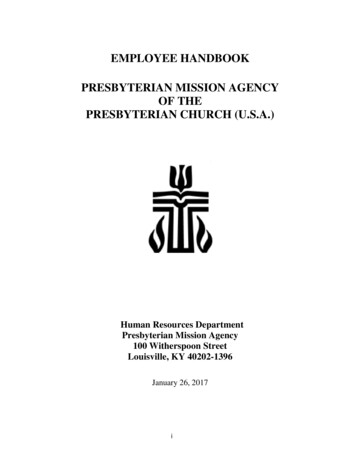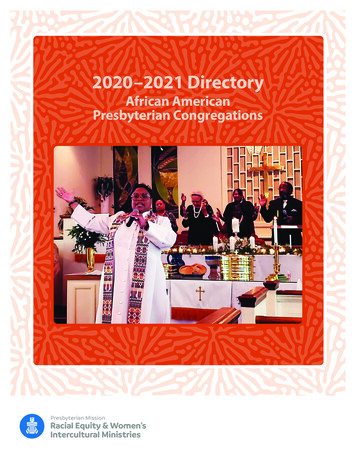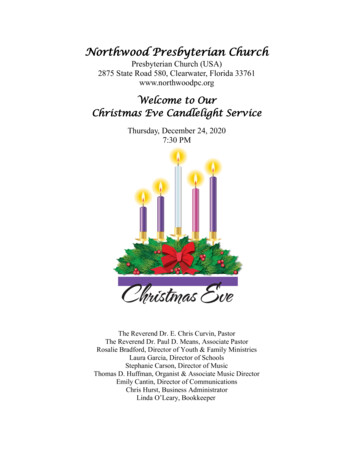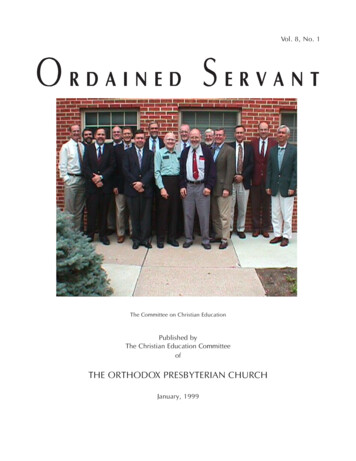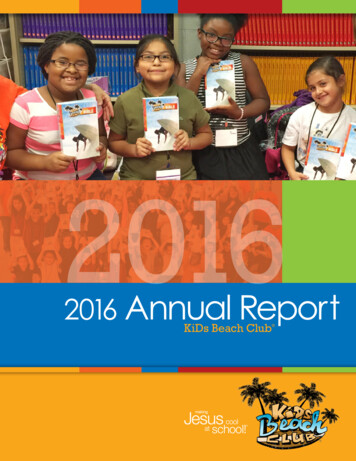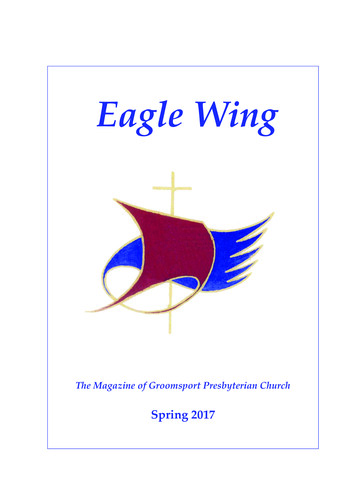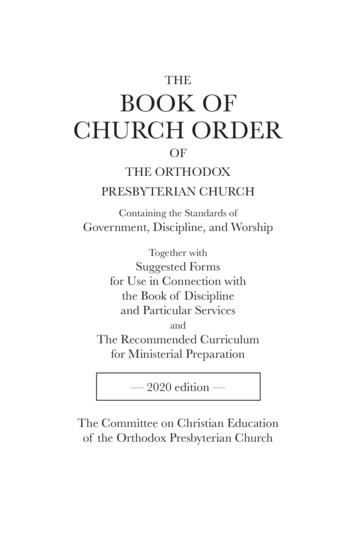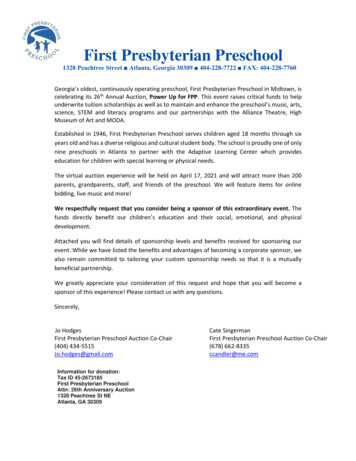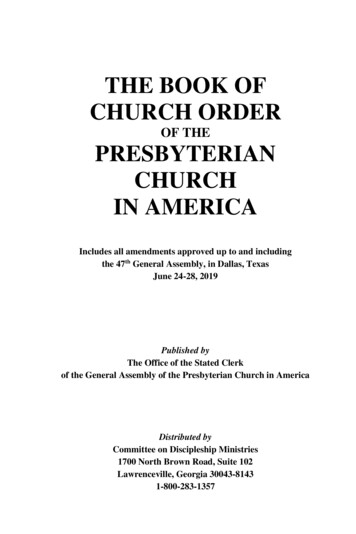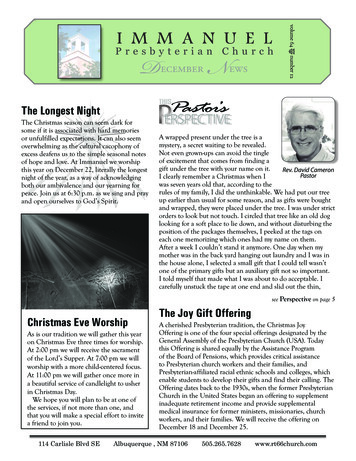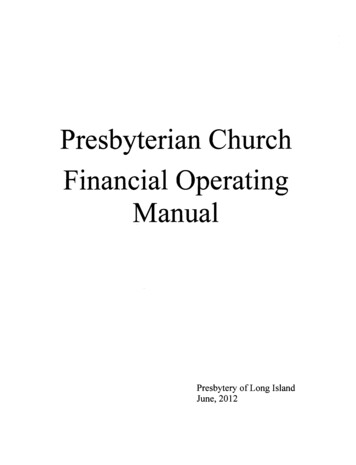
Transcription
Presbyterian ChurchFinancial OperatingManualPresbytery of Long IslandJune, 2012
PROLOGUEThis manual has been prepared by the Board of Trustees of the Presbytery of LongIsland, Presbyterian Church (USA). It is provided to the churches of the Presbytery as ameans of providing administrative assistance in the areas of basic financial procedures.The manual should be used to increase knowledge of good financial accountingprinciples within local churches. Since church and government policies are continuallyevolving, this manual is time sensitive and reflects tax and financial policies as of June 1,2012. Local churches need to be aware that the Book a/Order requires annual reviews ofthe financial records of local congregations. By following the recommendations made inthis manual such reviews can be readily made. The Board of Trustees of the Presbyteryof Long Island, by providing this manual, is not and cannot render legal, accounting, orother specific advice. Local churches are encouraged to seek assistance and advice fromprofessional local advisors when specific issues arise.We hope local churches, their staff and their boards will find this manual useful. Thismanual and other helpful tools and documents are also available on the Presbytery'swebsite: www.presbyteryofli.org. For additional information you may also go to thePresbyterian Church (USA) website: www.pcusa.org. If you have suggestions formaking it better, please telephone, write, fax or e-mail the Presbytery office.Presbytery of Long IslandPresbyterian Church (USA)42 Hauppauge RoadCommack, NY 11725Telephone: eryofli.org2
TABLE OF CONTENTSChapter 1 - Introduction .4Chapter 2 - Contributions and Income . 5Chapter 3 - Accounting .7Chapter 4 - Records . 9Chapter 5 - Budgeting . 10Chapter 6 - Payroll Policies and Procedures . 11Chapter 7 - Sample Forms . 18Chapter 8 - Chart of Accounts and Definitions .22Chapter 9 - Directory .23Chapter 10- Additional Resources & Acknowledgements. 243
Chapter 1 - IntroductionA church is more than a place of worship and spiritual enrichment. It also has buildings,equipment, land, programs, members and personnel. All these require various degrees ofmanagement and record keeping. The Board of a church (SessionlTrustees) has thefiduciary responsibility of governing, overseeing and verifying the operations of thesevarious component parts. The staff of a church, both paid and volunteer, has theobligation to implement properly the policies of the board and the church membershipwhich it represents.The Presbyterian Church is a connectional church which means that the local governingboard not only reports to the members of the church but also acts as an agent for thehigher judicatories ofthe Presbyterian Church including the Presbytery, the Synod andthe General Assembly. The Book of Order of the Presbyterian Church (USA) outlines ingreater detail these relationships and responsibilities.The purpose of this manual is to deal with the management oflocal church records andfinancial information. Issues regarding Personnel (Human Resources), Investments,Education, Programs, Charitable Services are outside the scope of this manual and areaddressed in other publications.The Three CategoriesThe management of records for a church can be separated into basically three categories:Contributions & Income, Accounting, and Records. Though separated into categoriesthey are all interrelated and interdependent. The failure to keep good membershiprecords can lead to a failure in the amount of contributions received. Likewise pooraccounting practices may lead to the underreporting of a member's contributions whichcan lead to a distrust of the church's organization and operations. The following chapterwill detail in greater depth the procedures and reporting purposes of these threecategories.4
Chapter 2 -Contributions & IncomeSafeguarding the Church's money is as much a part of stewardship as is cultivating apersonal spirit of gratitude and generosity. Paul writes in II Corinthians 8: 19-21: "Andwe are sending the brother who was chosen by the churches to accompany us as we carrythe offering . We want to avoid any criticism of the way we administer this liberal gift.For we are taking pains to do what is right, not only in the eyes of the Lord, but also inthe eyes of man."It is very important for the Session and Pastor to establish a strong system of internalcontrol for handling cash. The responsibility for overall stewardship of each churchresides with the Session. Though some of the below policies may be beyond thecapabilities of some smaller parishes, it is advisable that every effort be made to followthe intent of these recommended policies.A. Collections, Counting and Deposits1. Collected offerings should always be handled by two unrelated people.2. Those who handle church funds regularly should be bonded. (normally throughthe insurance agent handling the church's insurance policies.)3. Receipts and disbursements should be handled separately and assigned todifferent people.4. Church funds should not be taken to anyone's home.5. Financial reports should be audited annually, and detailed monthly reports shouldbe kept and reviewed.6. Follow the entire trail of the collection, observe when it might be at risk anddetermine what changes might increase security without disrupting the worshipservIce.7. Immediately after the collection is taken, have at least two alert, able-bodiedpeople take the collection quickly and discreetly to a secure office or safe andlock it up.8. Rotate the counting teams, and establish a policy that they count the money in alocked area immediately after worship. Document the offering on a standardizedform, signed by each counter. Give copies to the financial secretary and otherswho need them.9. For security reasons, when possible, direct that two people take the collection tobe deposited. Have them use different doors to exit the church and alternateroutes to the bank each week. Keep the bank bag concealed.10. Train everyone who handles the collection to follow the procedures outlined inyour security and safety plan.11. Review the plan on a regular basis.5
B. Recording and Acknowledging Contributions1. All receipts must be recorded on the church's books in a timely manner,preferably daily, but alleast weekly, to ensure the accuracy of interim and year end financial data. A record of each individual/family members' contributionmust be kept. Other donations from groups, agencies, individuals should belikewise recorded. All back up materials including contribution envelopes,letters of donations, etc., must be kept for sufficient time to allow for auditing ofaccounts and correction of records. These receipts must be reconciled with thechurch's monthly bank statements.2. Statements should be prepared on a regular basis for contributors. Quarterly isrecommended but at least on an annual basis. Statements should include thefollowing confirmation request: "This statement is for your records. Pleaseexamine it carefully. If it does not agree with your records, please communicatedirectly to the Church Treasurer/SecretarylPastor/Other designated individual."An annual statement needs to be mailed to all contributors for IRS purposes.Substantiation letters for contributions of 250 or more should be generatedwithin 30 days of receiving the contribution with a copy retained for the church'srecords. IRS regulations recommend that the church's federal identificationnumber be included with all acknowledgement letters along with the following orsimilar statement "No goods or services were received in consideration of thisgift."3. Care should be taken to properly identify, separate and record contributionsaccording to wishes of the contributor. Funds for special projects of the nationalchurch or other agencies should be transmitted to them in a timely manner.Funds for particular local church projects (such as organ fund, building fund,deacons fund, camp fund etc.) should be properly identified and disbursed onlyfor those projects, unless there is an agreement from the donor to change thedesignation. When such an agreement cannot be obtained, special action by theboard, and in certain instances by higher judicatories, must be made.C. Program Income and Receipts1. Various program income, including tuition and registration fees for the pre school nursery, camps, field trips, educational courses, bake sales, dinners, etc.must be properly recorded, receipted and deposited.2. The designated bookkeeper/financial secretary should prepare a deposit list thatshows the name of the individual(s) paying the amount collected, the program towhich the income is attributed, the date funds are collected, the method ofpayment (cash/check/money order) including identification numbers and anyother pertinent information including period of time for tuition or telephonenumber of individual making payment in case of a NSF check.3. Such funds should be deposited in a timely manner, daily if possible, but at leastwithin one week of receipt.6
Chapter 3 - AccountingIn order to insure the veracity of financials, as well as the financial health of anyorganization certain internal controls and recordkeeping procedures are necessary.Control systems put in place should properly and efficiently deal with the receipt ofmonies, the management of these resources, and the disbursement of funds for neededservices and goods. These systems also will provide the documentation necessary intimes of audit by governmental agencies, public and private funding sources, mediainvestigators and various public oversight groups.Such controls should provide assurance that: Cash (including checks and electronic transfers) that is received, was in factreceived and recorded promptly and accurately; Cash disbursements have been made for authorized purposes only, and have beenproperly recorded. Cash is accurately stated and appropriately safeguarded.These controls need to be reviewed by the governing board, included in the by-laws orrules and regulations, and tested to determine that all monies received and expended areproperly recorded, deposited, authorized, and released. Minutes of governing boardmeetings as well as officer's meetings must be recorded to show the above review andagreement thereto, as well as, consequent changes to these controls. These controls needto provide: A procedure for approving expenditures; Purpose for said purchases and expenditures that are clearly within the guidelinesand goals of the ambulance company. Required signatures on checks; Procedures and documentation required for distribution of said checks; Designation of depositories and the officers responsible for handling cash; Requirements for the bonding of individuals who have access to cash and otherassets; Any other information relating to theses monies.Though governmental and church statues are silent concerning the exact type and wayrecords should be maintained, it is recommended that: Cash receipts records should be maintained to identify the date, amount and sourceof each amount received. Cash disbursements records should identify the date, check number, payee andamount of taken for specific designated accounts. Any disbursement should beproperly authorized according to the procedures agreed to by the governing board.All disbursements should require an initiating signature on a purchase order plus asignature verifying services or goods were received. Disbursements above acertain amount ( 2500 recommended but to be determined by the board) need to beindividually approved by the board and so noted in the minutes. The signature orsignatures on the check should not be one of those initiating a request or be one ofthose verifying services or goods were received.7
8Checks written for amounts of 1000 or over require two signatures. Checkwritten for amounts below 1000 may be written with one signature (Board maydecide that two signatures are needed on all checks).Personnel being paid for services should either be issued payroll checks ormiscellaneous income checks with W-2s or 1099s issued at year end.Personnel being reimbursed for purchases of supplies and goods should includeauthorization information/signatures and be made only upon appropriate proof ofsuch purchase (an itemized receipt). Reimbursement should be in a timely manner,suggested on a monthly basis.Unsigned and non-issued checks should be safely secured, kept and issued innumerical order, and only made available to those authorized to issue and sign suchchecks.Supporting records, such as vouchers (claims), invoices, cancelled checks,duplicate deposit slips and bank statements should be safely secured and also beavailable and maintained on file in order for audit and referral purposes.A separate bank account(s) for benevolent funds may be kept. A separatebookkeeping ledger system should be kept for such benevolent funds so as to easilymaintain separation from operations funds.Separate accounting for major church sponsored activities including pre-schools,schools, camps, building funds, etc should be kept. Such accounts must berecorded in/linked to the master accounting program of the church. Separate bankaccounts for these activities may be kept, but only when the size of the activity sowarrants.Such separately maintained records will facilitate annual reviews, reports andbudgeting.Such records need to be reconciled monthly with the appropriate bank account(s).That such reconciliations occur need to be verified on an annual basis.Acknowledgement letters be sent to all donors over 250 in accordance with IRSregUlations.The governing Board should review the adequacy of the insurance coverageannually and document in the minutes.
Chapter 4 - RecordsA. Membership1.2.3.4.Individual membershipBaptized childrenNon active membersNecrology (deceased members)These records are the responsibility of the Clerk of Session, though they may be kept by achurch office staff or other member. In January of each year a report on membershipmust be filed electronically with the General Assembly Office in Louisville. Assistancewith this may be obtained from the Stated Clerk of the Presbytery of Long Island.B. Recorded Events1. Baptisms2. Confirmations3. Weddings4. Funerals5. Ordinations6. Dedications (Buildings/organs/windows, etc.).C. Leadership1.2.3.4.Clergy Dates & years of serviceElders Ruling (Ordination date, installation dates and years of service)Deacons (Ordination date, installation dates and years of service)OthersD. Buildings, Land and EquipmentThough churches are mostly exempt from Property and Income taxes and are thereforenot required to depreciate assets, it is most appropriate to record the item and value attime of purchase/acquisition on the books of the church. In the case of copyingequipment it may also be helpful to set us an amortization account so as to be able topurchase new equipment upon the retirement of the old or to renew the lease for saidequipment. For insurance purposes it is also necessary to keep records regarding thevalue/replacement value of said buildings and equipment.E. Licenses, Permits, Certificates, Warrantees, Deeds, and Building & Site Plans9
Chapter 5 - BudgetingAn annual budget should be drawn up for presentation to the annual meeting of thecongregation and approved by the Session of the Church. Part of the annual budget is theannual terms of call of the pastor. The Committee of Ministry of the Presbytery providesthe guidelines appropriate for the terms of call.The Session with the assistance of the StewardshiplFinance Committee needs todetermine the projected income (both contributions and program income) for the comingyear. Projected expenditure should be provided by the various committees of theSession, as well as other program activities of the church.Budgeting for the Pre-School Nursery and any camp programs should be undertaken sixmonths before the beginning of the appropriate fiscal year of operation. School/campattendance for the coming year should be properly forecast. Any increase above 5 percent needs to be justified in the notes accompanying the budget. Total increases insalaries should be in the current inflation range or also justified in the notesaccompanying the budget. The budget should be firstly approved by theleadership/council/committee of the activity and then according to the policies of theSession (board) be given to them for approval.10
Chapter 6 - Payroll Policies and ProceduresNOTE:Churches both large and small, are experiencing difficulty with thefederal and state tax authorities because they do not understand thatmajor changes have occurred in the past few years regarding their potential tax liabilityand their reporting responsibilities. The days of "we're too small" and "the dollarsaren't large enough to matter" are now gone. Tiny organizations are being penalized forfailure to report their quarterly payroll obligations even though it might be onlyafewdollars. The minimum penalty is 50.00 per failure, plus interest.Gone also are the days when the part-time custodian made too little, or workedtoo infrequently, to take out tax withholding or Social Security. Even if there is noemployee there is still the reporting responsibility for payments made to independentpersons, such as lawyer, accountant, painter, roofer, or plumber.The treasurer is the officer ofthe church who is responsible for compiling andcertifying the accuracy ofthe data to the federal, state and local tax offices. Compliancewith church payroll policies, IRS and state regulations is required.Purpose: To provide policies and procedures relative to payroll matters includingemployee classifications, pay periods, and record keeping. The proper recording andmaintenance of payroll records is essential not only in determining the costs ofchurch/school/camp operations, but also for Federal and State reporting purposes. TheInternal Revenue Service (IRS) and local taxing authorities require employers to maintainrecords of the compensation paid to each employee performing services for thechurch/school/camp. They also require various payroll reports to be prepared andsubmitted according to specific filing schedules. Compensation is usually the largestsingle expense of a church/school/camp. For all these reasons, church/schools/campsmust exercise extreme care in all matter relating to payroll processing and accounting.A. Employee Classifications for Tax Reporting PurposesIt is particularly important for the church/school/camp to correctly determine theemployee classifications for workers because different payroll withhold and reportingrequirements exist for different types of workers, namely, employees and/or independentcontractors. The IRS defines an employee as "anyone who performs services subjectto the will and controls of the employer both as to what shall be done and how itshall be done" and receives remuneration for such services.The employer-employee relationship is determined not by job title, work assignment, orthe intent or desires of the worker or employer, but critical factors. Although none of thefactors is considered to be controlling in employment determinations, the IRS has tendedto classify a rather broad range of workers as employees, rather than independentcontractors. Churches/Schools/Camps should carefully consider the twenty (20) factorsbefore determining a worker's employment status, keeping in mind that it is seldomwrong to classify a worker as an employee. Employers may request a statusdetermination by filing Form SS-8, Determination of Employee Work Status for Purposes11
of Federal Employment Taxes and Income Tax Withholding. Churches/Schools/Campsthat need additional information should contact their accountant, the Presbytery Office orthe IRS. An individual's employment status remains the same even if the individual isperforming more than one job in the church/school/camp. All compensation paid bychurch/school/camp to an employee should be reported on that person's Form W-2 andthe proper and appropriate taxes withheld.It is important to note that employee classifications for tax reporting purposes is notnecessarily determinative of an employee's eligibility for benefits including health,pension, disability and unemployment. Care should be taken to review an employee'sstatus in relation to any benefit plan separate from an analysis for tax reporting purposes.1. ClergyClergy are considered dual status employees: For Federal Income Taxpurposes, clergy are employees and receive a W-2. Their wages are reported onForm W-2 and they are subject to State, Local and Federal income taxes. ForSocial Security purpose, clergy are self-employed. They are subject to and payself-employment tax, which is handled on the Clergy's Federal Income tax return.Clergy are considered as professionals and are exempt employees for the purposesof overtime.2. Lay EmployeesLay Employees are fully subject to Federal, State and Local Income taxwithholdings on their earnings. The church must also withhold Social Securityand Medicare taxes and pay the employer's matching share. At the beginning ofthe calendar year one should consult Circular E, issued by the IRS each January,for the proper withholding rates. If a Payroll Service is used, that service willautomatically adjust the payroll checks, but the church should know the adjustednumbers for the purpose of budgeting. The church/school/camp should establish aformal system to record the work of all employees. This recording system maytake the form of timecards, payroll sheets, or a time book. At a minimum, therecord should show the number of hours worked each pay period, compensatorytime earned and used, holiday hours, vacation and sick leave earned and used, andother miscellaneous types of hours used per the program(s) employing theemployee.All employees earning less than 455 per week ( 23,660 per year)must be paid overtime when they work more than forty (40) hours in oneworkweek (Holiday, vacation, sick and comp time hours do not count as hoursworked in determining overtime hours.)3. Independent ContractorsChurches/Schools/Camps may sometimes enlist the services of workerswho are not employees and who are not working as part of an organized businessenterprise. These workers are called Independent Contractors. The church/school/camp should require the vendor to complete IRS Form W-9 in order toobtain the required tax identification information. A Form 1099-MISC should be12
issued at years end to any non-corporate independent contract to whom it pays 600 or more in one calendar year. (Note: All legal fees paid even if to acorporation or ifbelow 600 must be reported on Form 1099-MISC.) No taxesshould be withheld from payments to independent contractors, and thechurch/school/camp should not pay Social Security or Medicare taxes or otherbenefits for them.The IRS takes a hard line when differentiating between an employeeand an independent contractor. The IRS continues to declare this an area ofspecial interest and attention. The difference between paying an independentcontractor and paying an employee is that the employee has tax withholdings onhislher paycheck while an independent contractor is responsible for the paymentof their taxes. If the IRS deems a vendor to be an employee when thechurch/school/camp is treating the vendor as an independent contractor, the IRScan assess the church/school/camp the taxes that would have been withheld, pluspenalties and interest. The IRS considers a few critical factors:ooooRight to Control Does the employer have the right to control the workand the details of how the services are performed?Right to Discharge - Does the employer have the fight to discharge thevendor?Furnishing Tools Does the employer furnish the tools to perform thejob?Furnishing Place to Work Does the employer furnish the place toperform the job?Of all the mentioned above, control is the key. If the employer has theright to control the details and means by which the service is performed, then theindividual is probably an employee. If the employer only has the right to controlthe final result, then the individual is probably an independent contractor.Extreme care in should be taken in satisfying any worker as an independentcontractor. Churches/schools/camps should immediately terminate therelationship with any independent contractor who makes his or her servicescontingent upon NOT having compensation reported to the IRS. There is nooption by law, all payments of 600 or more in one calendar year to oneindividual must be reported to the IRS and to the individual.B. Pay Period, Payday and Hours of workEach program/area of employment will determine the hours of work. There should beone unified pay period for all employees and a standard payday following the close of thepay period.C. TimesheetsAll non-exempt employees will be responsible for preparing and signing a Time Sheet.A Time sheet will be maintained for each employee for each pay period. The time sheetshould be used to record hours worked, paid time off and holidays. At the end of the pay13
period, the employee should sign the time sheet. If an employee is absent the day thatTime Sheets are due (Le. illness, injury, etc.) the employee's supervisor should completeand submit the Time Sheet and notify the person responsible for payroll of anycorrections upon the employee's return.D. Payroll DeductionsBy law, the church/school/camp is required to deduct, where applicable, Federal andState withholding taxes, Social Security taxes and garnishments. Voluntary deductionsmay include, group health and life insurance premiums, 401k and 403b deductions,excess federal an state withholding, etc.E. Pay AdjustmentsIf an employee discovers an error in their paycheck, they should review the matter withthe person responsible for payroll processing so that correction, if necessary, can bemade. Changes to an employee's wage withholding (Form W-4) filing should besubmitted along with their Time Sheet for the period that the change is to becomeeffective.F. AdvancesAdvance payment of earned wages should not be allowed. Employee advances for travelmay be made upon approval of the Board/Administrator. Such advances must bedocumented on a Check Requisition Form and receipts and other appropriatedocumentation provided immediately upon return from the trip. Any unused advancemust be returned to the church/school/camp at that time. If an employee does notdocument advances, the total advance must be added to the employee's Form W-2 atyear-end and reported as taxable income to the employee.G. GarnishmentsBy law, churches/schools/camps are required to honor legal garnishments of employees'wages. The employee will be notified of any garnishment received by thechurch/school/camp.H. Lost PaychecksDirect deposit for all employees should be strongly encouraged so that lost paychecks arenot an issue. Employees should report checks lost to the person(s) responsible forpayroll immediately so that stop-payment order may be initiated. The person responsiblefor payroll and/or the appropriate administrator will determine when a replacement checkcan be issued.14
I. Final Paychecks/Separation PayNew Yorkemployers are required by statute to immediately pay discharged (dismissed,terminated or resigned) employees their accrued earnings or to pay them in the next payperiod. When an employee voluntarily quits (resigns), New York statutes require that theemployer pay accrued earnings on the next regular payday. In either ofthese situations,the employer has the right to reduce the employee's final paycheck by any lawful chargesor indebtedness owed by the employee to the churchischooVcamp. The supervisorterminating the employee should carefully review the employee manual and thepersonnel file to determine all funds owed to the employee. The failure to comply withthese statutory requirements, without a good faith legal justification for non-compliance,may make the church liable for one and one-half times the unpaid compensation due tothe employee plus the employee's legal fees.J. Unemployment CompensationNew York State requires that workers be provided Unemployment CompensationBenefits. Churches are provided special treatment in that they can be self-insured forappropriate staff (reimbursement basis) or they participate directly by paying theunemployment tax during the processing of payroll and remitted to the StateUnemployment Insurance Department (tax basis). For churches with schools and campsor other activities that involve multiple staff it is advised to use the tax basis plan and payunemployment insurance on a regular basis.K. Workers' CompensationWorkers' Compensation should be provided for all employees. The employer pays forthe insurance which is usually through the State Worker's Compensation Fund, thoughprivate plans may be available. In case of an injury it is important to follow the properreporting process including the completion of appropriate forms. Claims must bereported within 48 hours of an injury. It is important to obtain proper physicianscomments and signatures.L. Taxable WagesAll compensation paid to lay employees must be reported to the IRS and State ta
The Presbyterian Church is a connectional church which means that the local governing board not only reports to the members ofthe church but also acts as an agent for the higher judicatories ofthe Presbyterian Church including the Presbytery, the Synod and the General Assembly. The Book ofOrder ofthe Presbyterian Church (USA) outlines in
